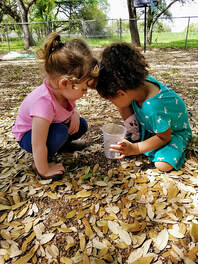
So, why is the loss of unstructured play so important?
What can we do introduce more free play into the lives of our children? Try incorporating the following strategies into your daily activities:
- Increase the amount of time allotted to free play. 3 hours of unstructured play time daily is the recommended amount of play. Ideally 4-6 hours a day would be devoted to play. Time spent playing at school can be included in the play time. Work play into daily tasks that need to be completed. Take play breaks during homework tasks, put some cups or bowls in the tub during bath time, hop scotch back the hallway on the way to get dressed in the morning, dance while brushing teeth, or act out the story while reading.
- Decrease the amount of time they spend in front of a screen. General recommendations are 30 minutes to – 1 hour of screen time. I would recommend less than that during the busy school week. Change I-pad or T.V. time to board game time or free play time.
- Let your children take the lead in free play. Dr. Yogman, a pediatrician and author of the book, "The Power of Play: A Pediatric Roll in Enhancing Development in Young Children,” states that child-led play and exploration builds a child’s ability to function effectively in our increasingly complex world.
- Provide your child with “child powered” toys. Think old school when buying toys. Electronic toys can only be played with in a limited number of ways while a doll or a box of blocks can be used in a variety of ways.
- Allow your child to discover nature’s playground. Allow children to play in mud puddles, climb trees, dance in the rain, or play eye-spy with things found in nature. Really the options are limitless.
- Encourage your child’s teacher to use more play based learning. The link included below is a great resource for teachers who want to include more play into the school day. The more play time they get at school the less playtime you have to try to make up for at home. https://www.learnersedge.com/blog/play-in-the-classroom
Additional resources on the importance of play:
https://www.patagonia.com/blog/2017/11/why-is-unstructured-play-crucial/
https://themilitarywifeandmom.com/why-kids-wont-listen/?fbclid=IwAR0pYxvbXxfsxpsI8MDQNis9SBx4doY-BIExf3HJSS6kZnJF_QI5JtDqbHQ
https://wehavekids.com/education/Preschoolers-Learn-Best-Through-play
https://www.edutopia.org/article/time-play-more-state-laws-require-recess?utm_source=facebook&utm_medium=socialflow
https://www.adn.com/opinions/2019/02/18/childrens-play-is-critical-for-healthy-development/?fbclid=IwAR1lfvQLkQOHKjUOg6UrdvtyWH9AU6s8Cu-dQV-b3ul9w3BfTFrHorEtKJ8
https://viewpoint.pointloma.edu/bringing-back-play-what-the-loss-of-play-means-for-our-children/?fbclid=IwAR3vaeRx0gYbGfxHD756dp7P44yZxMdFIYRoPhz-_9zXHrsHv4dJuOMOVAM
https://www.outdoortopia.org/blog/bringing-classroom-education-outside-in-our-schools?fbclid=IwAR13Apqx0jKA1G_K3YHlQV_8kBkcZOSwhN7noOU1HoJDJ80eRq1PhTq_DZk



 RSS Feed
RSS Feed
